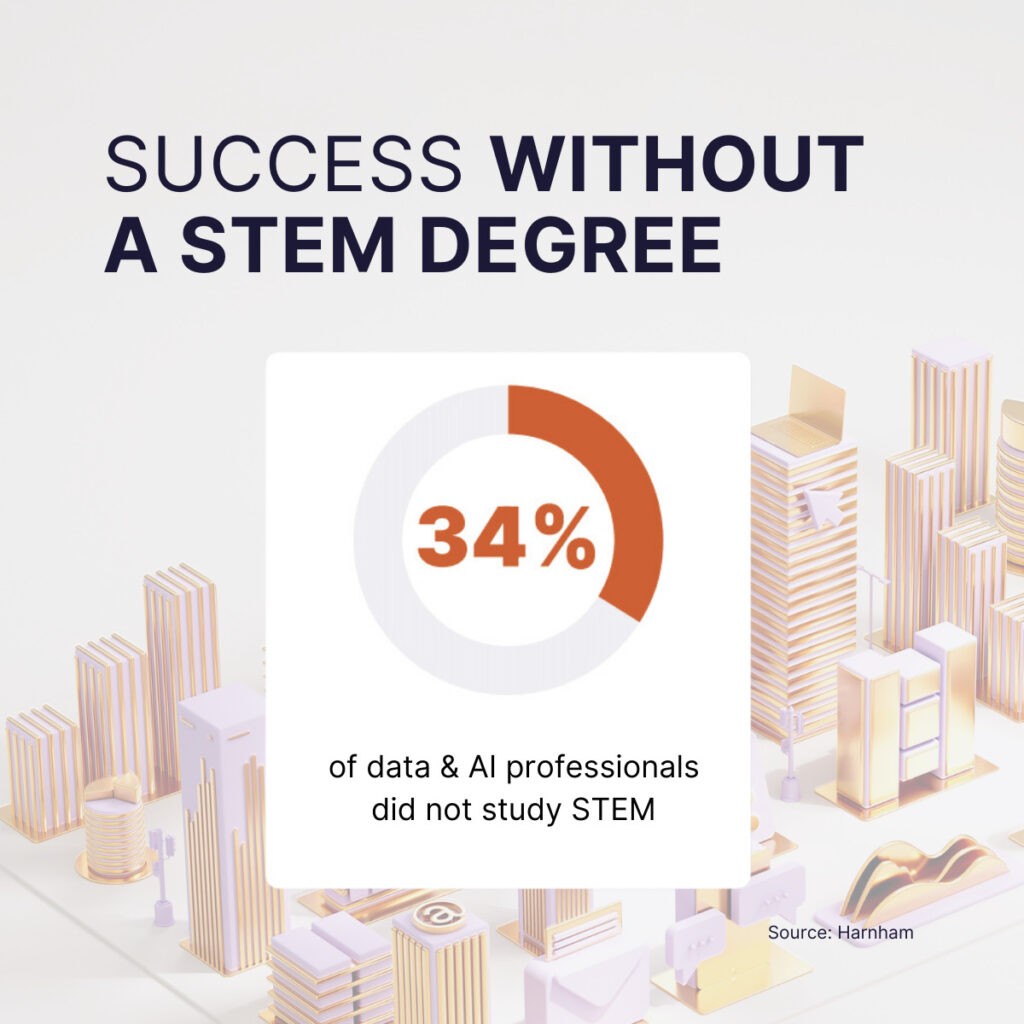09 Sep 24
Tips to Succeed in Data Without a STEM Degree
By Farah Hussain
I graduated in Politics with French, ventured into retail management, dabbled in entrepreneurship, a mini course in SQL and now… I am a Data Consultant at Rockborne. Switching paths to data has been a transformative journey for me, and you can do it too.
Here are some tips and things to consider if you want to work in data.
What is data?
To work in data, you need to know data. Your Netflix recommendations, store vouchers, Fitbit stats – these are all examples of how we interact with data daily. But what exactly is data, and why is it so central to modern life? At its core, data can be structured or unstructured, quantitative or qualitative, and it forms the basis of many decisions and insights in both personal and professional contexts. These fundamentals are crucial for leveraging data effectively, and it will lay the groundwork for applying your skills in a data career, helping you tackle real-world challenges and make impactful decisions.
Understanding business decisions
Businesses and other organisations (charities, health organisations etc.) all use data to make decisions, solve problems, and improve their outcomes. Data provides valuable insights that help in shaping strategies, enhancing efficiency, and achieving goals. Understanding how businesses use data will help you see how data drives decisions and solves problems, giving you a better foundation for starting your career in data.

[Source: Harnham’s 2024 UK Data & AI Salary Guide]
The role mathematics plays
To succeed within data, you don’t need to have studied maths A-Level/degree, but you do need to learn key mathematical concepts to help you understand and work with various data tools and visualisations effectively.
Some key concepts to look into:
- Statistics: Basics like median, mean, mode, and standard deviation.
- Probability: Understanding the likelihood of different outcomes.
- Algebra: Solving simple equations and working with variables.
- Graphs, charts and tables: Interpreting and creating visual representations of data.
Attention to detail
Attention to detail is crucial in a data career. Ensuring accuracy in data collection, analysis, and reporting helps avoid errors and provides reliable insights. Small mistakes, like a misplaced decimal or incorrect data entry, can lead to significant inaccuracies. Developing strong attention to detail will enable you to deliver precise and trustworthy results which is essential in any data role. You can fine-tune your attention to detail by doing puzzles and brain teasers!
Soft skills
Don’t forget – soft skills are just as important as technical abilities. Being able to communicate complex data insights clearly to non-technical stakeholders is crucial. You’ll need strong problem-solving abilities to navigate data challenges and critical thinking will also help you analyse data thoroughly. Reflect on your experiences from university or part-time jobs where you’ve presented information, interacted with people, or tackled challenges – these instances have sharpened your soft skills and will enhance your effectiveness in a data role.
What next?
To kickstart your career in data, it’s essential to dive in and start gaining hands-on experience. You’ll need to become proficient with various tools and coding languages, which is where Rockborne can help! The graduate training programme offers an opportunity to develop both technical and soft skills, setting you up for success in the data field. Embrace the learning process, ask questions and you’ll be well on your way to a rewarding career in data.
—
Are you a graduate keen on data and looking for a chance to kickstart your career? Rockborne could be the place for you with our Data Programme!
Our 4-week, free training boot camp is open for applications – this is a chance for you to gain new data (Excel, SQL & PowerBI) and communication skills through a specially designed programme led by our dedicated training team.
The program is held remotely (except for day 1 and day 20 when you’ll pop into our London office to say hi!). It’s open to all graduates—no matter what you studied, where, or the grade you got. What really matters to us is your eagerness to learn and your interest in building a career in data.
Apply HERE.
Related posts
Life at Rockborne20 Jun 25
Federated Learning: The Future of Collaborative AI in Action
Federated Learning: The Future of Collaborative AI in Action The way we build, deploy, and govern AI is evolving, and so are the expectations placed on organisations to do this...
15 Apr 24
Game Development at Rockborne: How is Python Used?
Just how is Python used in game development? In this blog post, we see the Rockborne consultants put their theory into practice. As the final project in their Python Basics...
09 Jan 24
Machine Learning in Healthcare: Cancer Detection
Skin cancer is a prevalent and wide-ranging health concern, affecting millions of individuals globally. As with most illnesses, early detection of cancer significantly improves the likelihood of successful treatment. Because...

